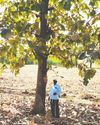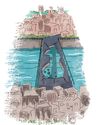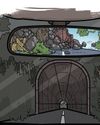Plastic solutions

KALADWAS IS one of the few Rajasthan villages that offers door-to-door waste collection for all 710 households. For this task, the panchayat has hired two full-time waste collectors with a salary of ₹8,000 a month. The village administration recently even submitted a proposal to the district administration to avail funding for a material recycling facility, which is a setup for large-scale sorting of recyclable waste such as glass and certain reusable plastics like bottles.
Still, non-recyclable plastic products such as polythene bags, plastic cups, plates and wrappers are strewn all over the village. Plastics and other solid waste have clogged all waterbodies and drains and they are regularly burned in the open. Incineration of plastic waste in open fields is a major source of air pollution and such burning releases toxic gases like dioxins, furans, mercury and polychlorinated biphenyls into the atmosphere.
"While our household waste is collected daily, we do not know what to do with it. As a result, we end up dumping the waste in the open or burning it," says Nirmal Patel, a 32-year-old resident of the village. He adds that several incidents have been reported in the past when stray animals choked on plastic waste.
This story is from the August 16, 2023 edition of Down To Earth.
Start your 7-day Magzter GOLD free trial to access thousands of curated premium stories, and 9,000+ magazines and newspapers.
Already a subscriber ? Sign In
This story is from the August 16, 2023 edition of Down To Earth.
Start your 7-day Magzter GOLD free trial to access thousands of curated premium stories, and 9,000+ magazines and newspapers.
Already a subscriber? Sign In

US tariffs on drugs and the end of WTO
Trump's plan to levy duties on pharma violates WTO rules, but there is no recourse as the trade regulator is dysfunctional

TAMING THE TEAK
Tissue-cultured teak has potential to boost India's timber cultivation and trade, but requires identifying best farm practices

MAGNETIC FLIP-FLOP
Earth's magnetic field, our shield against cosmic radiations, has a history of reversals and anomalies. From setting up observatories and satellites to analysing ship logs and archeological surveys, scientists are piecing together its past to uncover clues about future shifts. Yet, many mysteries remain

DUST TO DUST
Millions of Indians work in dusty mines, factories and construction sites, facing a deadly yet underreported lung disease called silicosis. National-level data on the illness caused by dust inhalation is virtually absent.

Promising start
Sexed semen technology can revolutionise India's dairy sector. But its impact on biodiversity must not be ignored

TIRELESS CHRONICLERS
Every decade since 1974, scholars, activists, students and journalists have embarked on a unique 45-day journey on foot through the hinterlands of western Himalayas to revive and restore the lost ties RAJU SAJWAN

'Integrate health, physiology to assess heat impacts'
When we think of extreme heat, the discussion often focusses only on the mortality it causes. However, it affects individuals differently. JOY MERWIN MONTEIRO, assistant professor at the Department of Earth and Climate Science at the Indian Institute of Science Education and Research, Pune, is studying how a combination of environmental and individual factors determine the risk of heat-related health impacts. In an interview with HIMANSHU NITNAWARE, Monteiro discusses the concept of heat strain—the physiological burden extreme heat places on the body—and why understanding it is crucial to safeguard the population. Excerpts:

In search of new homes
As Asiatic lions outgrow their last refuge in Gujarat’s Gir forests, they are crossing the state borders and even venturing into unlikely coastal areas to establish new territories

Invisibilised localities
AN ETHNOGRAPHIC STUDY ON THE NETWORKS, CULTURAL TRADITIONS AND OBSTACLES FACED BY RESIDENTS OF JHUGGIS AND TRANSIT CAMPS WHILE DEALING WITH EVICTION POLITICS AND INEQUALITIES IN DELHI

TUNNEL VISION
Bengaluru's civic body must ascertain suitability of the city's geology before moving ahead with its tunnel road project for seamless travel
